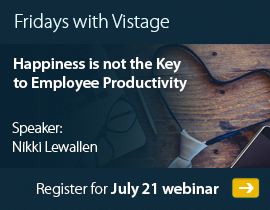Aim for engagement (not job satisfaction) to increase productivity

Twenty years ago, job satisfaction and employee engagement may as well have meant the same thing. “Are you ‘happy?” was the standard to which employees were held to measure their commitment to their jobs. On the surface, they seem almost interchangeable. But a happy employee doesn’t always mean an engaged one.
Today, workers want more out of a job than a paycheck, which forces us to think deeper about what true employee engagement means and if it’s exclusive from mere satisfaction. Employees now expect to be engaged in their jobs—to have a role that makes an impact and contributes to the bigger picture of the company mission. This makes things difficult for companies looking to solve disengagement by simply throwing money at the problem with bonuses and a snack bar. While those perks are great, they don’t do much in the way of inspiring employees to contribute to the company vision.
Let’s start with some quick definitions:
Job satisfaction: How happy or content an employee is at his or her job.
Employee engagement: An employee’s intellectual and emotional connection with an employer, demonstrated by motivation and commitment to positively impacting the company vision and goals.
Satisfaction is simple. It’s a matter of checking a few boxes:
- Good pay? Check.
- Great benefits? Check.
- Flexible time off? Check.
But people aren’t that simple. They’re complex. They’re deeper—and they expect deeper engagement than just surface-level perks (while those are still important and often contributors to overall engagement).
It’s not just about culture or the employees themselves, either. It’s about business. Teams with high employee engagement rates are 21% more productive than those that aren’t engaged. What’s more, they’re also 27% more likely to report “excellent” performance in their role. Conversely, Gallup states that actively disengaged employees actually cost the US $450 to $550 billion per year in lost productivity.
Can we really afford to have teams of employees that aren’t engaged?
Which would you prefer?
It may seem like having satisfied employees (instead of engaged ones) is an acceptable goal to aim for. But it’s entirely possible that an employee who has job satisfaction is not actually engaged in their role, creating untapped potential and lack of effort to accomplish that extra 10% past their day-to-day expected duties.
For example:
Greg is an employee who is satisfied with his salary and happy with the fact that he receives great benefits for his family, as well as a shorter work day in order to go pick up his kids from school. But without being truly engaged in his role, he produces the bare minimum of what is expected of him and withholds his absolute best work because he doesn’t believe in the mission of the company. See the problem?
Let’s put it this way:
Job satisfaction: Are you going to stay?
Employee engagement: Are you going to drive the business forward?
If the threshold for being satisfied in your job is simply not hating it, do you really want those people working for you? Employees are engaged when they are motivated to do more than the bare minimum just to “stay afloat.”
Happiness isn’t the key to improving productivity. Engagement is. If your employee culture and productivity are less than ideal, throwing money at the problem isn’t going to do the trick. Instead of treating the symptoms of disengagement with surface-level “quick fixes,” dig deep to solve the problem of the deeper issue. Find out what makes your employees tick—what motivates them, inspires them, and drives them to do their best work for the good of the company mission—and harness that energy into increased productivity and better business.
Register for the upcoming Vistage webinar “Happiness is not the Key to Improving Employee Productivity ” to find out why purpose-driven cultures make the most productive, competitive, and successful businesses.
Category: Talent Management
Tags: Emplify, Employee Engagement, job performance, National Sponsor


